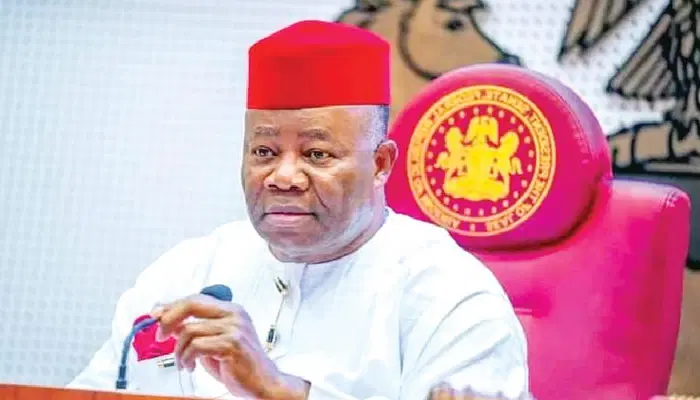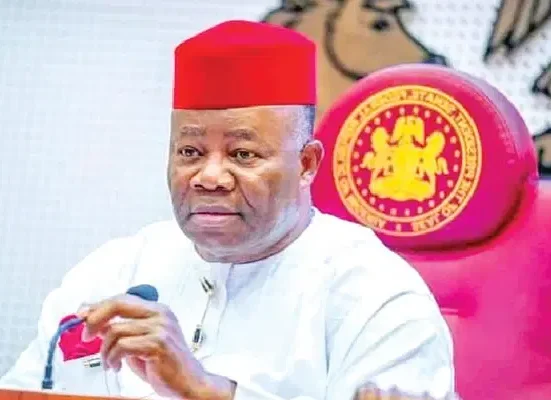Senator Babafemi Ojudu, a chieftain of the ruling All Progressives Congress (APC) and former Special Adviser on Political Matters to ex-Vice President Yemi Osinbajo, has raised concerns over the leadership style of Senate President Godswill Akpabio, stating that it does not project the Senate in a positive light.
In an interview with Daily Trust, Ojudu assessed the state of Nigeria’s democracy, the opposition’s chances in the 2027 elections, and the National Assembly’s swift approval of President Bola Tinubu’s emergency rule in Rivers State.
Opposition’s 2027 Strategy: Strength in Unity
On the potential of a formidable opposition coalition ahead of the 2027 elections, Ojudu noted that while it is too early to predict, a strong opposition is essential for democratic growth.
“For democracy to thrive, Nigeria needs viable political parties across the spectrum. A dominant single-party system does not serve the best interests of democratic development. I support strengthening the opposition—not because I want the APC defeated, but because democracy thrives when there is balance and competitive political engagement,” he stated.
He, however, warned that opposition leaders must prioritize collective purpose over personal ambition, saying, “If they focus on individual aspirations rather than building a unified, people-oriented movement, they risk becoming another failed venture.”
Rivers Emergency Rule: A Rubber-Stamp Senate?
Ojudu criticized the National Assembly’s hasty approval of the state of emergency in Rivers State, arguing that such a crucial decision should have undergone rigorous debate.
“A democracy functions best when institutions maintain checks and balances. When a matter as sensitive as a state of emergency is waved through without thorough scrutiny, it weakens public confidence in the legislature,” he said.
Addressing allegations that lawmakers were pressured or incentivized to support the declaration, Ojudu noted that the actions of some legislators raised questions about their commitment to their constituents.
“If legislators are not firmly grounded in their party’s ideology or committed to the people who elected them, they can be easily swayed. Look at Bauchi State—three PDP Senators, a governor who opposed the emergency, yet no senator stood their ground. That’s concerning,” he remarked.
Akpabio’s Leadership and the Senate’s Image
The former senator expressed disappointment in the current state of the National Assembly under Akpabio’s leadership, suggesting that it has failed to uphold the Senate’s independence.
“As a committed APC member, I say this with all due respect: Akpabio’s leadership has not projected the Senate in a positive light. The Senate is a sacred institution that requires sobriety, impartiality, and a deep sense of democratic responsibility. When history is written, this period may not reflect well on legislative independence,” he stated.
Ojudu also weighed in on the recent clash between Akpabio and Senator Natasha Akpoti-Uduaghan, describing it as a sign of Nigeria’s weak democratic culture.
“The Senate should be a model for civil discourse, not a battleground for personal ego clashes. That exchange was unfortunate and highlights the need for deeper respect and decorum in legislative engagements,” he noted.
State Capture or Weak Opposition?
Addressing concerns that President Tinubu’s administration may have a firm grip on the legislature, Ojudu argued that the real issue is the weakness of the opposition rather than outright state capture.
“In a strong democracy, the opposition serves as a counterbalance. Unfortunately, many opposition lawmakers today operate as lone actors without a unified platform or ideological clarity. That’s the bigger danger to democracy,” he explained.
2027 Elections: Will the Youth Make a Difference?
Ojudu also spoke on the possibility of a generational shift in Nigeria’s political landscape, referencing the Obidient Movement’s impact in 2023. However, he expressed skepticism about its long-term sustainability.
“Many elected under the Labour Party umbrella in 2023 came in by a twist of fate rather than through a well-planned strategy. Sadly, we’ve not seen much impact from them in the legislature. Some have defected to the ruling party, while others have gone silent,” he observed.
According to him, if young Nigerians want real political change, they must remain engaged beyond election cycles, organize effectively, and build strong platforms.
“If they fail to sustain the momentum, the old power structures will remain intact,” he concluded.
With the 2027 elections still some years away, Ojudu’s remarks highlight the critical issues shaping Nigeria’s political landscape, from legislative independence to opposition strategy and electoral reforms. KIIN360 will continue to provide updates on these unfolding developments.

